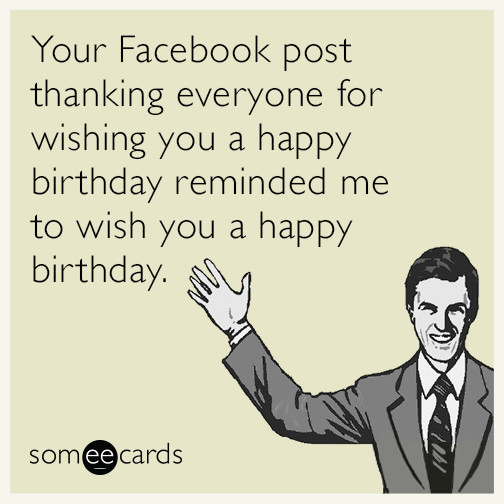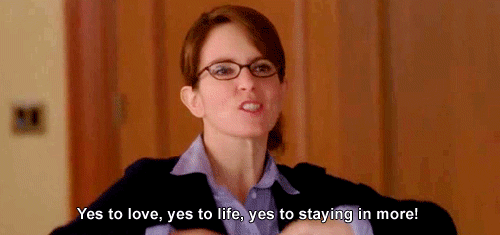In my last post, I came to the conclusion that one foundation of self-care is creating and maintaining healthy boundaries in working relationships.
Having moved across the country in the past year, I’m in the process of creating and maintaining an all-new set of relationships. And if my social media newsfeeds are to be believed, making IRL friends as an adult is something that a lot of people struggle with.
 |
| Three people throwing their fists in the air in unison. Text reads, "Team friendship!" |
To help me start with this reflection, I looked to the person in my life that is probably the best relationship-builder I know: my spouse, Caleb. Nearly all the people I now call friends are people I’ve met through Caleb. He has been asked to stand at weddings several times and he’s a godfather to two. His best friends are those he’s been friends with since FOREVER. And their friendships are not just of convenience, since we’ve moved so far from his hometown in Florida and they still keep in touch frequently. He tells basically every FB friend “happy birthday” and while I don’t understand it he sees is as an important Facebook Friend Role.
 |
| On the other hand, here's me. Image description: Person waving. Text reads, "Your Facebook post thanking everyone for wishing you a happy birthday reminded me to wish you a happy birthday." |
I’ve watched Caleb with curiosity for years, hoping I would gain some relationship-building through osmosis and in some ways I have. I’ve made a few accidental friends along the way that I’ve grown closer to than I would have if I hadn’t had Caleb as a relationship role model. In my self-reflection, I’ve started looking at ways I can build relationships more deliberately. And I thought looking to Caleb might be a good start.
While I could describe to you things I’ve seen in Caleb’s interactions with people, I figured I might as well see if he’d agree to answer a few questions himself. In part because I wanted to see how deliberate his relationship-building decisions are. He did, so these are below. My takeaways are in italics.
1. When you meet someone, how do you decide whether to start a relationship with them? What things do you look for?
Usually it just happens if I see a person enough and we have positive interactions. It doesn't hurt if they make me laugh either.
(Bryce note: I was so struck by the simplicity in this answer. I encourage you to do what this answer makes me do in my head right now: make a list of work and friendly relationships that have gone South, for whatever reason. Was your involvement in the first place this simple? I know I’m promising myself to make MORE decisions based on laughter. That sounds like a good life).
2. How do you decide whether or not they are, to use your terms, "good people"? I've noticed that you don't use this phrase when talking about everyone you have a relationship with. When you say "they're good people", what does that mean?
I don't know exactly how I figure out who is and isn't good people, my best guess would be we've shared some empathetic moment or came to some understanding about who each other happen to be.
(Bryce note: I asked him this because this is legitimately a phrase he uses and the thing about it is, Caleb has never turned out to be wrong when making a determination on whether someone is “good people”. Those relationships have yet to turn toxic in any way. But it makes sense. Empathy is a pretty good trait for someone to exhibit).
3. How do you approach a friendship? For instance, How do you let people know you'd like to be friends?
It was so easy when I was little: "You like Legos, riding bikes and Transformers cartoons? I like those things too let's be friends!"
I'm sure these things can still apply, but as an adult I discovered that most of my new friendships have developed in my workplaces where instead of toys and cartoons we're linked by a common goal.
In our new neighborhood community however I've made friends by liking cartoons, video games and comic books. With other adults.
I think with those I just introduced myself and usually had a beer or two with them while shooting the breeze about who we are.
(Bryce note: Our apartment is one of 20. We know many of our neighbors and sometimes gather together in our shared front yard. We have a Facebook group to discuss community issues or just tell each other we miss the sun. It seems weird in 2016 to do this and we are very lucky.
And wear geeky shirts. You never know what future friend you'll meet).
With my working relationships I tend to feel those out a little bit before I really let them in. As I've gotten older I've gotten a little more selective with how much of myself I reveal to coworkers until I know where they come from and what type of person they are.
(Bryce note: Caleb brings up an interesting point here. Since I usually don’t meet his work friends until they are actually friends. This makes me reflect on how working relationships can be friendly without being familiar, and maybe take away that you don’t owe your familiarity to anyone no matter how friendly your relationship. They are two different things).
5. When you make friends with someone at work, is that more like a working relationship or a friendship? Or does it have different parameters?
It's a working relationship more than anything, but more often than not things like that evolve. We've had dinners with my former/current coworkers after an event and then later, but not often we'd do stuff outside of work together.
(Bryce note: this is another answer that really struck me. I’ve seen questions on Facebook groups I’m a part of about other people from work “hanging out” without them, and I could relate. I had thought that Caleb was just SO MUCH BETTER at making work friends than me. But it’s true that many of our interactions have still been work-related.)
 |
| Liz Lemon making a celebratory gesture. Text reads, "Yes to love, yes to life, yes to staying in more!" |
6. How about when you make friends with other people in the [brewing] industry?
In this situation it's a bit of friendship and a bit of professional networking. I think a great example is James of [local La Crosse grocery store]. We met while I was conducting a beer tasting for PSB and during my weekends merchandising I'd take a little more time at his store(s) to chat, have a snack, help his customers with beer questions he may not have an answer to. After a while we got friendly, went to each other's weddings and hung out together at a music festival, not to mention our wives get along.
(Bryce note: this is absolutely true and I hadn’t thought about the nature of our friendship with James and spouse as being work-related, but it totally was. I brought up this question as a parallel to work-related friends from other libraries, like Twitter friends. And yup, now that I think about it, there was a Twitter friend at our wedding, too, and at least 2 more were invited.)
7. Have you ever tried to build a relationship( of any kind) with someone and the other person didn't want to? What did you learn in those experiences, if anything, to help you create new relationships?
I would say one for sure was a former coworker at a previous job. All I know is that our personalities just didn't match up at all. After a couple bristly interactions I decided that I would give him his space and only talk to him if I needed to. Takes all kinds to make the world go round, but we don't all have to be friends, yet we do have to share space to be decent to one another.
(Bryce note: Historically, my reaction to a non-receptive person is to just shove my personality down their throat until they are broken and realize resistance is futile. “We don’t have to friends” is a reminder that I don’t think I can hear enough.)
8. Is there anything else you want to say about building or sustaining relationships?
They take equal work from both sides to maintain a healthy, respectful relationship. Personal boundaries are important, but so is knowing when a friend needs you.
(Bryce note: A small message that boundaries help us to store our emotional labor for people and situations who truly call for it, and we aren’t feeling drained to deal with people who need someone to lean on in a time of crisis.)
Do you have a relationship role model? What do you look up to them for?
Or, conversely: How would YOU answer these questions?


No comments:
Post a Comment